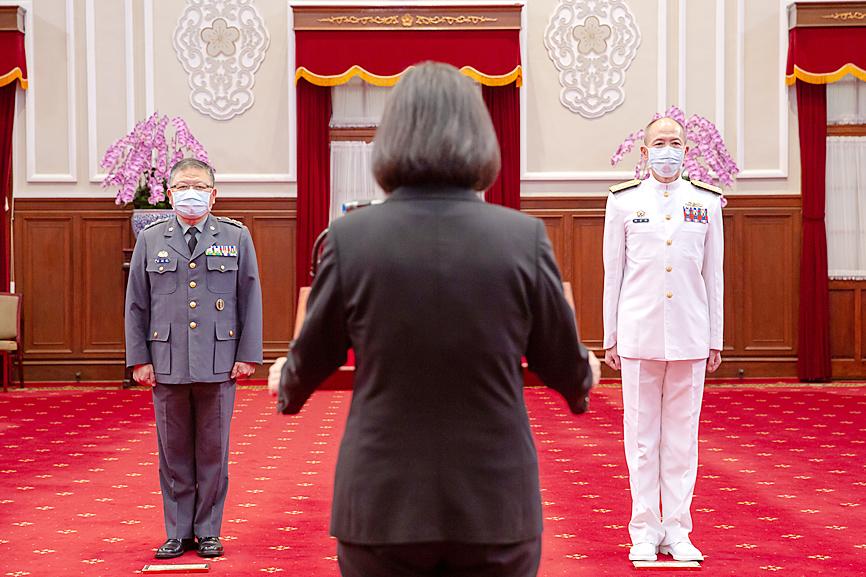President Tsai Ing-wen (蔡英文) yesterday touted the importance of enhancing the nation’s self-defense capabilities in a ceremony marking the shuffling of military brass.
Tsai’s remarks came amid rising tensions across the Taiwan Strait and on the same day the Chinese Communist Party celebrated the centennial of its founding in Beijing.
General Chang Guan-chung (張冠群), a former deputy minister of national defense, received the Order of the Cloud and Banner from Tsai, as he stepped down to assume the post of military strategy adviser at the Presidential Office.

Photo courtesy of the Presidential Office via CNA
Admiral Mei Chia-shu (梅家樹), the Deputy Chief of the General Staff and its executive officer, was promoted from vice admiral.
Taiwanese have high expectations for the armed forces and there is no time to wait to bolster national defense, Tsai said in a dedication at the Presidential Office in Taipei.
Chang’s decoration and Mei’s promotion were well deserved, and they are expected to continue their tireless work in improving the armed forces, she said.
As vice minister of national defense for armaments, Chang made immense contributions to the development of equipment, medical services and organizational work in military mobilization, Tsai said.
Chang’s grasp of technology played an important role in the development of armored fighting vehicle turrets, indigenous warship weapon systems and the T-5 Brave Eagle jet trainer program, she said.
He would continue to advise the government on improving weapons systems, she added.
Mei has a broad understanding of naval affairs from his tenure as captain of the ROCS Kee Lung, commander of the 146th Fleet and director of the Armaments Bureau, Tsai said, adding that she has full confidence in his ability to lead the navy.
Spouses of service members have the nation and the presidency’s gratitude for taking care of soldiers, she added.
The military confronts a complex environment shaped by the COVID-19 pandemic and China’s military threats, Minister of National Defense Chiu Kuo-cheng (邱國正) told officials at another ceremony on Wednesday.
The military is to focus on improving training standards, to ensure that troops act decisively, and implement the combined arms operational concept, he said.
Additionally, the military must strengthen multiagency cooperation in defense mobilization, and integrate civilian and wartime preparations, he said.
Officers should improve internal administration, exercise leadership, be thoroughly informed of the threat environment and possess the will to defend the nation, he said.

Taiwan has received more than US$70 million in royalties as of the end of last year from developing the F-16V jet as countries worldwide purchase or upgrade to this popular model, government and military officials said on Saturday. Taiwan funded the development of the F-16V jet and ended up the sole investor as other countries withdrew from the program. Now the F-16V is increasingly popular and countries must pay Taiwan a percentage in royalties when they purchase new F-16V aircraft or upgrade older F-16 models. The next five years are expected to be the peak for these royalties, with Taiwan potentially earning

STAY IN YOUR LANE: As the US and Israel attack Iran, the ministry has warned China not to overstep by including Taiwanese citizens in its evacuation orders The Ministry of Foreign Affairs (MOFA) yesterday rebuked a statement by China’s embassy in Israel that it would evacuate Taiwanese holders of Chinese travel documents from Israel amid the latter’s escalating conflict with Iran. Tensions have risen across the Middle East in the wake of US and Israeli airstrikes on Iran beginning Saturday. China subsequently issued an evacuation notice for its citizens. In a news release, the Chinese embassy in Israel said holders of “Taiwan compatriot permits (台胞證)” issued to Taiwanese nationals by Chinese authorities for travel to China — could register for evacuation to Egypt. In Taipei, the ministry yesterday said Taiwan

Taiwan is awaiting official notification from the US regarding the status of the Agreement on Reciprocal Trade (ART) after the US Supreme Court ruled US President Donald Trump's global tariffs unconstitutional. Speaking to reporters before a legislative hearing today, Premier Cho Jung-tai (卓榮泰) said that Taiwan's negotiation team remains focused on ensuring that the bilateral trade deal remains intact despite the legal challenge to Trump's tariff policy. "The US has pledged to notify its trade partners once the subsequent administrative and legal processes are finalized, and that certainly includes Taiwan," Cho said when asked about opposition parties’ doubts that the ART was

If China chose to invade Taiwan tomorrow, it would only have to sever three undersea fiber-optic cable clusters to cause a data blackout, Jason Hsu (許毓仁), a senior fellow at the Hudson Institute and former Chinese Nationalist Party (KMT) legislator, told a US security panel yesterday. In a Taiwan contingency, cable disruption would be one of the earliest preinvasion actions and the signal that escalation had begun, he said, adding that Taiwan’s current cable repair capabilities are insufficient. The US-China Economic and Security Review Commission (USCC) yesterday held a hearing on US-China Competition Under the Sea, with Hsu speaking on